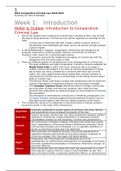Samenvatting
Comparative Criminal Law Week 1-5 SUMMARY (Keiler & Roef book; Fletcher book; ALL jurisprudence of relevance)
- Instelling
- Universiteit Van Amsterdam (UvA)
Comparative Criminal Law (3803CCQPVY) course summary of Prof Kevin Jon Heller with summaries from WEEK 1 - 5 including: From the literature: * Comparative Concepts of Criminal Law. Auteur: Johannes Keiler David Roef. Uitgever: Intersentia Ltd. * Rethinking Criminal Law - George P. Fletcher. Cover...
[Meer zien]














